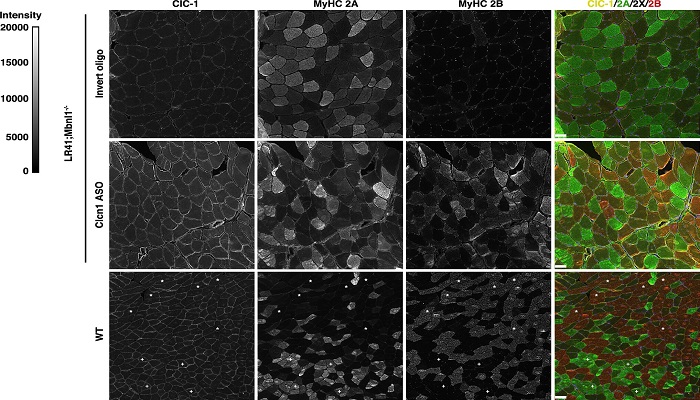Genetic Therapy Corrects Progressive Muscle Disorder in Mice – Investigators find at Massachusetts General Hospital
People with myotonic dystrophy experience progressive muscle weakness and repeated episodes of painless muscle stiffness called myotonia.
Investigators at Massachusetts General Hospital (MGH) recently used a targeted drug to restore muscle strength and correct myotonia in mice with myotonic dystrophy. The research, which is published in Nature Communications, could lead to new treatments for affected patients.
Myotonia in myotonic dystrophy is caused by abnormal processing (or splicing) of the transcript created from the gene that codes for the muscle chloride channel Clcn1, a protein that controls the flow of chloride ions into muscle cells.
The abnormal splicing leads to a truncated and poorly functioning Clcn1.
Also, the degree of weakness in patients with myotonic dystrophy is associated with higher amounts of oxidative, rather than glycolytic, muscle fibers. These fibers differ in how they obtain energy for contraction.
To correct the abnormal splicing in mice with myotonic dystrophy, a team led by Thurman Wheeler, MD, a neuromuscular researcher at MGH and an associate professor of Neurology at Harvard Medical School, used a genetic therapy involving small pieces of DNA called antisense oligonucleotides (ASOs).
The ASOs were based on a code that targets the abnormal splicing of Clcn1, and when injected directly into the animals’ muscles, the ASOs corrected the abnormality, boosted the abundance of functional Clcn1, increased the amount of glycolytic muscle fibers, and restored muscle health.
“Our findings show that muscle fiber type transitions in myotonic dystrophy result from myotonia and are reversible,” says Wheeler. “Our results also support Clcn1-targeting therapies as a way to increase strength and reduce muscle injury in patients.”
About the Massachusetts General Hospital
Massachusetts General Hospital, founded in 1811, is the original and largest teaching hospital of Harvard Medical School. The Mass General Research Institute conducts the largest hospital-based research program in the nation, with annual research operations of more than $1 billion and comprises more than 9,500 researchers working across more than 30 institutes, centers and departments. In July 2022, Mass General was named #8 in the U.S. News & World Report list of “America’s Best Hospitals.” MGH is a founding member of the Mass General Brigham healthcare system.
Source: Massachusetts General Hospital


